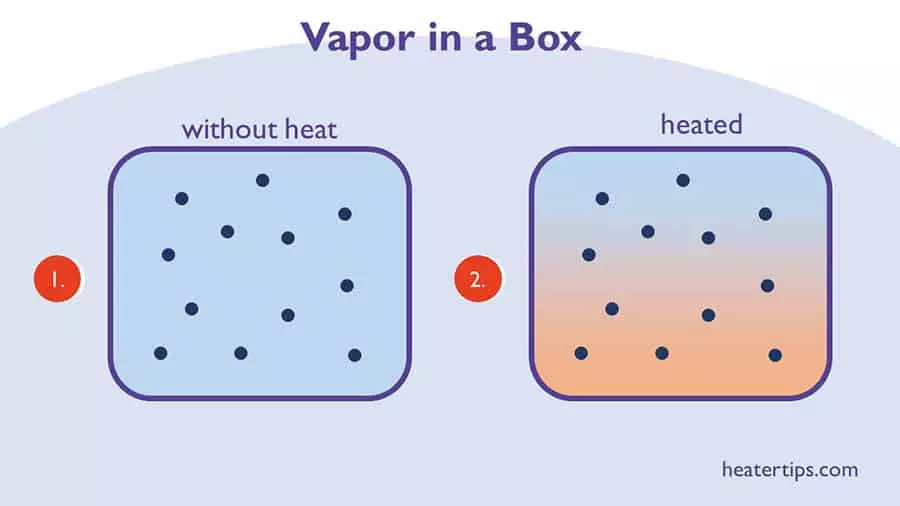Will a space heater dehumidify a room? Can it dry the air? If your room is damp and you want to know whether you can get rid of the moisture by using a space heater, this is the right place.
We’ll cover everything you need to know to understand exactly how space heaters affect the humidity in your room.
After reading this, you’ll know how to dehumidify your room, and, if you want, how to humidify your room with a space heater as well (you can actually do both if you know how).
But let’s take a look at how space heaters impact humidity first. Here’s the quick answer.
Question: Will a space heater dehumidify a room?
Answer: No, space heaters don’t dry out and dehumidify the air in your room. However, the increase in temperature will cause the relative humidity to go down. The air just feels dryer, because it can absorb more moisture from your skin.
Let me explain to you how space heaters impact the humidity in your room.
How Space Heaters impact moisture
When you run a space heater on full power, you often feel like the air dries out. But why?
I mean, this is a pretty interesting question. Here’s why:
Think of a closed box (your room). Nothing can enter and leave this box. It’s sealed tight. The box contains just damp air and a space heater. Now let’s turn the heater on. What happens?
The temperature inside the box increases. But because nothing can pass through the walls of the box, the amount of moisture (water) stays the same. The water can not leave the box.
When you run a space heater at home, it’s exactly the same thing. Your room is the closed box and your space heater heats the air. The amount of humidity stays the same because it can’t leave your room.

Let’s note: The amount of humidity in your room (absolute humidity) is constant.
For some reason, when you run a space heater, the air does, in fact, feel dryer. This has to do with relative humidity.
Why space heaters seem to dehumidify the air in your room
Now we know that space heaters actually don’t change the overall humidity in your room. As long as you keep your house closed, no air (or rather very little air) exchange takes place.
Moisture doesn’t automatically vanish just because you’re using a space heater.
Here’s why the air feels dryer in a heated room:
Even though the absolute humidity stays the same when you use a heater, the relative humidity changes.
Let me explain.
How space heaters lower relative humidity
In contrast to absolute humidity, which measures how much water vapor is in the air, relative humidity measures how much water vapor is in the air relative to the temperature.
The reason is that warm air can actually hold much more water than cold air!
When you heat your room with a space heater, the temperature increases, while the absolute humidity stays constant. This means that the relative humidity decreases.
Therefore, a space heater reduces the relative humidity in your room.
Okay: The absolute humidity stays the same, and the relative humidity decreases when you use a space heater. So, what?
We as humans can’t sense absolute humidity. We don’t have the capabilities to do so. The only type of humidity that matters for our well being is relative humidity. Relative humidity measures how much water is in the air compared to how much water it can potentially store.
What is relative humidity?
A relative humidity of 100% tells you that the air is completely filled with water. It can not store hold more. Whereas a relative humidity of 50% would tell you that the air currently only stores about 50% of what it potentially can.
We sense relative humidity like this:
The air that surrounds you always absorbs sweat and moisture from your skin. The higher the relative humidity is, the less water it can absorb (because it’s already saturated). In environments with high humidity, you will feel sweaty and uncomfortable. The air is damp and full of water.
In contrast, air with low relative humidity feels dry, because it wicks away moisture and sweat from your skin. Dry air is like a sponge that absorbs all the water it can find.
As already said, the warmer the air gets, the more water it can store. This way, space heaters lower relative humidity: They increase the amount of water the air can hold. The air just feels dryer.
How to control humidity with a space heater
“A pleasant indoor climate is essential for a sense of well-being in the home. Room humidity can have a major impact on the quality of the living environment.”
The right level of humidity in a room is essential for feeling comfortable. If you know how, you can use space heaters to humidify and dehumidify a room as you please.
If you run a space heater alone, it can’t have an impact on the absolute humidity (the total amount of water in the air). But with air conditioning, you can help yourself.
Trick your air conditioner with a space heater to dehumidify a room
Generally, you can use air conditioners to dehumidify a room. However, you can improve the dehumidifying by using a space heater.
Air conditioners suck the humidity out of a room. If you feel like your air conditioner doesn’t pull enough humidity and your room still feels damp, you can set the thermostat of your air conditioner lower and additionally turn on your space heater.
The space heater’s job is to heat the room. Meanwhile, the aircon tries the opposite: It tries to cool down the air.
Because the space heater is a heat source, the air conditioner won’t stop running because it attempts to cool down the space heater. As long as it’s running, it’s absorbing the moisture from the air.
In contrast, if you would use the air conditioner without a space heater, it would stop working right when it reaches the wanted temperature. With a space heater, the wanted temperature can not be reached and the AC keeps dehumidifying the air.
Note: This dehumidifying method requires lots of power. I’d suggest not to run your space heater with the air conditioning on for more than half an hour at a time.
How to make a heated room less dry?
On the other hand, you might wonder how you can humidify a heated room that feels dry.
This is actually straightforward.
First method - Heating a water-filled baking tray
Place a large cookie sheet, baking tray or similar in front of your heater. Your baking tray should have as much surface area as possible. Fill it with a thin layer of water and place it in front of your space heater. The water will evaporate and humidify the air in your room.
Second method - Using your shower
This second method works incredibly fast. Within just a minute you will have a humidified room. Sadly, it does not always work because you need a bathroom next to the room you want to humidify.
Anyways:
Turn the shower on full heat for a minute. This will create lots of water vapor. You can then redirect the water vapor to your room using a fan or something similar.
I found this works best if the bathroom is connected directly to the room you want to humidify.
Conclusion - Will a space heater dehumidify a room?
A space heater will reduce the relative humidity in your room and make the air feel dryer. Although, the general amount of water in the air actually stays constant. Because the air is hotter than before, it can just suck up more moisture.
You can even use a space heater together with an air conditioner (I know this sounds counterintuitive) to increase the dehumidification rate. Additionally, this will even decrease the absolute humidity.
I hope this article helped you in some way! In case you want to learn more about space heaters, here’s an article I recommend as a next read: Infrared vs. Radiant Heaters: Are they the same?
